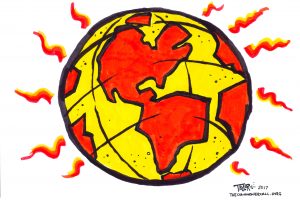“The most dangerous form of climate denial is no longer Senator Jim Inhofe throwing a snowball on the Senate floor to prove that global warming isn’t real, or Trump calling climate change a Chinese hoax. It’s liberal and centrist politicians who should know better appealing to “bipartisan consensus,” immediately shifting the blame to other countries when the U.S. has among the highest per-capita emissions in the world, or asking, “How will we pay for it?””
— Thea N. Riofrancos, The Democratic Debates Showcased the Most Dangerous Form of Climate Denial (In These Times, 6/28/19)
*****
‘Completely Terrifying’ — Study Warns Carbon-Saturated Oceans Headed Toward Tipping Point That Could Unleash Mass Extinction Event
By Julia Conley
Common Dreams (7/9/19)
The continuous accumulation of carbon dioxide in the planet’s oceans—which shows no sign of stopping due to humanity’s relentless consumption of fossil fuels—is likely to trigger a chemical reaction in Earth’s carbon cycle similar to those which happened just before mass extinction events, according to a new study.
MIT geophysics professor Daniel Rothman released new data on Monday showing that carbon levels today could be fast approaching a tipping point threshold that could trigger extreme ocean acidification similar to the kind that contributed to the Permian–Triassic mass extinction that occurred about 250 million years ago.
Rothman’s new research comes two years after he predicted that a mass extinction event could take place at the end of this century. Since 2017, he has been working to understand how life on Earth might be wiped out due to increased carbon in the oceans.
“If we push the Earth system too far then it takes over and determines its own response—past that point there will be little we can do about it.”
Rothman created a model in which he simulated adding carbon dioxide to oceans, finding that when the gas was added to an already-stable marine environment, only temporary acidification occurred.
When he continuously pumped carbon into the oceans, however, as humans have been doing at greater and greater levels since the late 18th century, the ocean model eventually reached a threshold which triggered what MIT called “a cascade of chemical feedbacks,” or “excitation,” causing extreme acidification and worsening the warming effects of the originally-added carbon.
Over the past 540 million years, these chemical feedbacks have occurred at various times, Rothman noted.
But the most significant occurances took place around the time of four out of the five mass extinction events—and today’s oceans are absorbing carbon far more quickly than they did before the Permian–Triassic extinction, in which 90 percent of life on Earth died out.
The planet may now be “at the precipice of excitation,” Rothman told MIT News. …
(Our work is licensed under a Creative Commons Attribution-Share Alike 3.0 License. Feel free to republish and share widely.)


